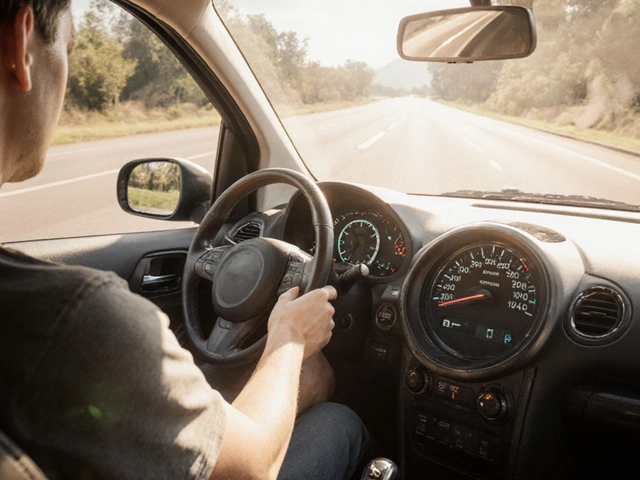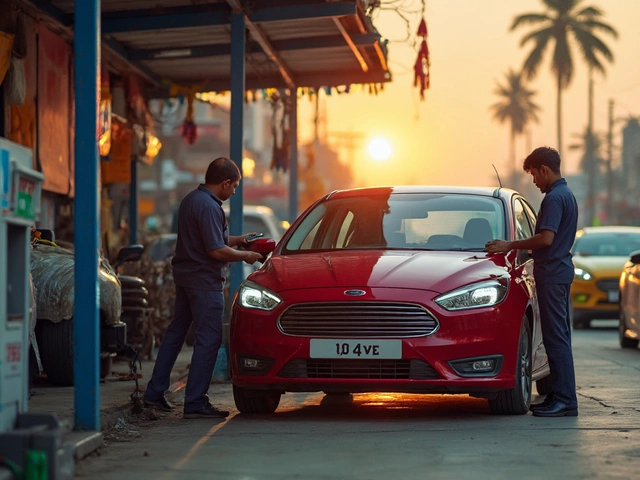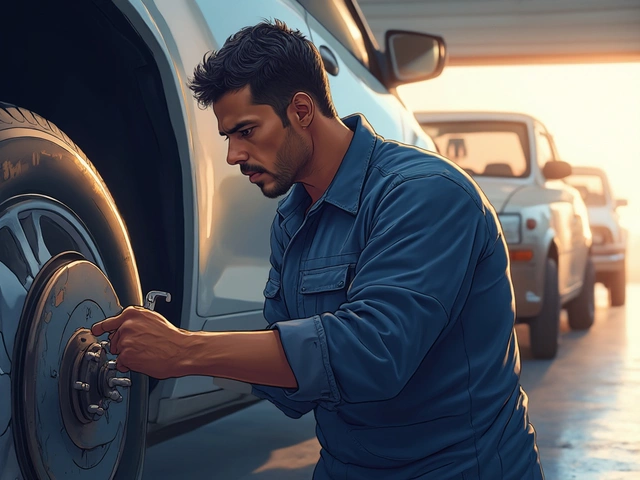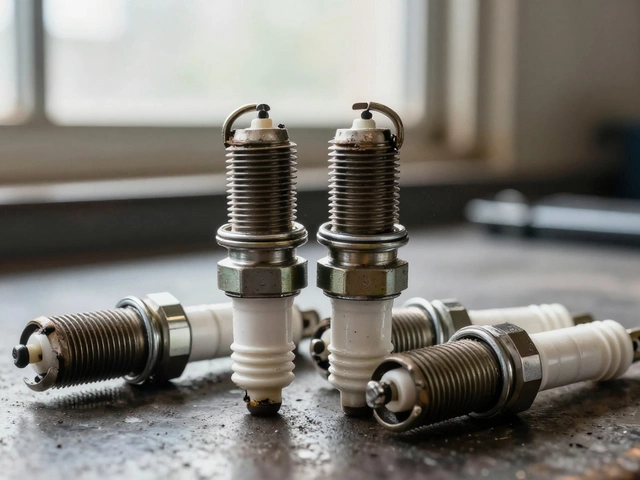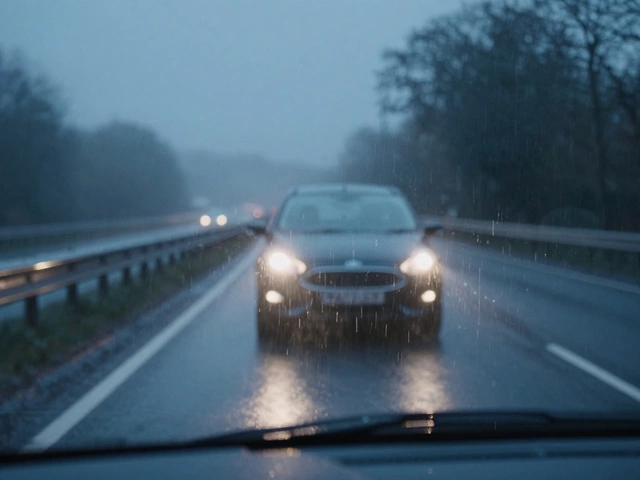
If your car starts making odd noises under the hood, don't just crank the volume on your playlist—pay attention. A bad radiator doesn't sit quietly waiting for disaster. It tells you things are off, often before you see steam pouring out or the dashboard temp needle creeping up. Catching radiator issues early can keep you off the side of the road and save some hard-earned cash.
The most common suspect? Rattling or knocking noises coming from the front of your engine bay. Some folks describe it as clinking, like someone shaking small metal pieces in a can. Sometimes, you'll hear a bubbling or gurgling sound, especially after you turn off the car. That bubbling? It's not normal. It usually means your coolant is boiling; that never ends well if ignored.
Other folks hear whistling or even hissing. That points to pressure sneaking out of a tiny crack or a loose hose around the radiator. If you ever catch a sweet smell along with these sounds, that's coolant—it's leaking and needs your attention.
- Weird Noises: What to Listen For
- Why Radiators Make Strange Sounds
- How to Confirm It's the Radiator
- Fixing the Problem: Quick Tips
Weird Noises: What to Listen For
If your engine bay starts sounding like a bag of marbles or a soda fizzing, you could have a radiator problem. Car radiators are usually pretty quiet, so any odd sound is worth checking out. The main clue is what kind of noise you're hearing. Here are some of the most common ones:
- Clinking or rattling: This usually means something is loose, like a bracket, cap, or even cooling fan touching the radiator. Sometimes rust breaks off inside old radiators and bangs around as you drive.
- Gurgling or bubbling: This usually hints at air trapped inside your cooling system or that your coolant is boiling. That's not normal, especially if your car’s been off for a few minutes and you still hear it. Air pockets can mess up coolant flow and lead to overheating.
- Hissing: This sound points to high-pressure steam or air escaping. It often comes from a pinhole in the radiator or a bad hose. If it smells sweet, that's coolant leaking out.
- Whistling: Less common, but a whistling sound can mean a small crack or loose fitting is letting air escape under pressure. It can also be heard when the radiator cap isn’t sealing right.
So, how common are these sounds? According to a recent survey by a U.S. auto repair association, 61% of overheated engines had warning noises before breaking down. Here’s a quick way to match the bad radiator sound to possible issues:
| Sound | Possible Cause | What to Do |
|---|---|---|
| Clinking/Rattling | Loose parts, debris inside radiator | Inspect for loose fans, brackets, or internal rust |
| Gurgling/Bubbling | Boiling coolant, trapped air | Check coolant level, inspect for leaks |
| Hissing | Coolant or steam leak | Look for wet spots, pressure test the system |
| Whistling | Pinhole leak, loose cap | Tighten or replace cap, inspect for cracks |
Ignore these sounds and you might end up waiting for a tow truck. Next time your car doesn't sound right, pop the hood and see if one of these noises could mean trouble with your radiator.
Why Radiators Make Strange Sounds
So, what’s actually going on when you hear odd noises from your radiator? It all comes down to how your radiator and cooling system work. The radiator is there to keep your engine from overheating by circulating coolant that absorbs and throws off heat. But when something messes with this process—boom, the weird sounds start.
One common cause is air trapped in the system. Coolant is supposed to flow smooth and steady, but trapped air bubbles get pushed around by the water pump. When those bubbles hit the radiator, you might hear bad radiator sound like bubbling or gurgling, especially just after shutting off the engine.
If you hear rattling or knocking, watch out for loose or broken radiator mounts. Radiators are bolted in, but over time those mounts can fail. The radiator itself or the fan blades could knock against other parts, making metal-on-metal sounds.
Hissing or whistling? That’s usually pressure escaping somewhere. Radiators build up a lot of pressure when the engine gets hot, so if there’s a tiny crack in the plastic tank or a pinhole in a hose, hot coolant or steam will sneak out fast—making a small hissing that gets worse over time. Sometimes, the radiator cap isn’t holding pressure properly, which also causes strange noises and makes your cooling system work poorly.
The oddest sound some folks hear is a clinking, almost like marbles rolling around. When coolant gets old or mixes with the wrong type, it can cause rusty flakes and mineral deposits inside the radiator. These little bits get sloshed around and hit the sides, causing the clinking. That’s a sign it’s way past time for a flush or even a new radiator.
If any of these sounds turn up, don’t ignore them. Ignoring a noisy radiator can lead to leaks, overheating, or even a cooked engine—that’s a whole new level of headache and expense.

How to Confirm It's the Radiator
Hearing weird noises from under the hood is a red flag, but you need to be sure it's the radiator before spending money or making repairs. Here’s how you zero in on the real issue without ending up wasting time or cash.
Start by popping the hood (after the car cools down, always). Look for any puddles or wet spots under the radiator. Coolant leaks are a dead giveaway. If you see green, yellow, or orange fluid on the ground or around the radiator, that’s not normal. It means there’s a crack or maybe a loose connection somewhere.
Next, run the engine for a few minutes and listen. Try to notice if the bad radiator sound is louder near the radiator compared to other parts, like the belts or water pump. Lightly tap the radiator with something non-metal (like a plastic screwdriver handle). If the noise matches what you heard while driving, odds are it’s the radiator.
Another check: watch the temperature gauge as the car runs. If it starts rising quickly even on a short drive, the radiator probably isn’t doing its job. You might also spot steam or notice a sweet smell (that’s boiling coolant).
- Check the radiator cap. Hissing or bubbling under the cap points to pressure or air in the system, which usually traces back to a radiator problem.
- Inspect the hoses. Squeeze them (with gloves on if hot). They should feel firm, not squishy or collapsed. If they’re soft or bulging, that’s more proof the radiator or cooling system is the culprit.
If you want to get really specific, you can use a flashlight to spot tiny leaks or cracks. Sometimes a white or rust-colored crust forms where coolant is leaking out and drying up. That crusty stuff is a telltale sign.
| Sign | What It Means |
|---|---|
| Noisy rattles or knocking | Damaged radiator core or loose parts |
| Bubbling/gurgling sound | Coolant boiling or trapped air in radiator |
| Coolant leak | Cracked radiator, loose hose, or bad seal |
| Steam or sweet smell | Overheating and coolant escaping |
| Rapid temp spikes | Radiator can’t cool engine properly |
Keep an eye on these checks—they’re your best bets for getting ahead of bigger trouble. If you spot several of these signs together, it’s almost always time to bring your car in for a real fix or swap out that worn-out radiator.
Fixing the Problem: Quick Tips
So you think your radiator is failing and those weird noises are getting louder? Here’s what you actually need to do—no guesswork, just action.
- Bad radiator sound is your cue to pop the hood, wait for things to cool down, and check if your coolant level is low. Top it off if it’s below the mark, but don’t just keep filling it without finding the real issue.
- Scan for leaks—look for green, pink, or orange spots under your car. That sweet smell means trouble. Trace the leak back to its source; common spots are the hoses, the radiator cap, and the joints where hoses connect.
- If you hear a bubbling or gurgling sound, especially after shutting off your engine, air may be trapped in the system. Bleed the radiator by slowly opening the bleed valve—no pressure, no burns.
- Rattling or knocking? Check the mounting brackets and the fan shroud. Sometimes, you’ll just need to tighten a bolt or replace a cheap rubber bushing.
- Whistling or hissing points to pressure loss. Replace any worn or cracked hoses right away. Radiator caps only cost a few bucks and a faulty one can wreck your whole cooling system.
If you’re out of your depth, trust a pro. According to AAA,
"Ignoring signs of cooling system failure is one of the leading causes of roadside breakdowns during summer travel."Don't be one of those folks stuck on the shoulder.
Want to keep things smooth? Flush and refill your radiator every 2-3 years, and always use the coolant grade recommended by your car’s manual. Spot a problem early, and you won’t pay for a tow—or a new engine.
